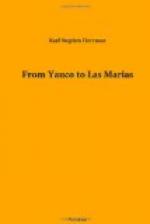I don’t suppose there is anybody that knows the value of a letter better than a soldier does. A few blotted lines from his mother or sister or sweetheart are meat and drink and fine raiment for his soul. He feels brave again and good again and—homesick again. He makes life a burden for the whole camp until he has borrowed or stolen a scrap of paper and a stubby pencil wherewith to make reply. He sits down in some convenient spot, with emotion fairly oozing from every pore, and for a solid hour he wrestles with his tools and vocabulary. The result probably does not altogether please him. He feels that he has said too much about his lack of socks, the toughness of his fare, the flatness of his purse. All the love and tenderness he meant to set down have somehow refused to leave him, even in description. But he knows he will be massacred if he goes howling for more paper; and so he sends off what he has written, counting the weary days until his answer comes. The man who first invented writing was, without doubt, the greatest man that ever lived.
[Illustration: A very Popular Spot.]
[Illustration: Two Knights and a Pawn.]
On August 25 it was decided to bring all but four companies of the brigade into quarters at Mayaguez, chiefly because a great deal of sickness had begun to spring up in the outlying camps. This was accordingly done.
* * * * *
Scientific agriculture and prosperity have long been regarded as almost synonymous terms in Puerto Rico.
The provincial government established and maintained an experimental station at Rio Piedras, for the purpose of promoting a technical knowledge of the native soil-products; and the results of this step have proved invaluable. The recent director of the station, Senor Fernando Lopez Tuero, wrote, while in office, several monographs on tropical agriculture; which I have been at some pains to translate in my search for absolutely reliable information relating to that subject. Senor Tuero is considered, to be a high and conservative authority by those of his compatriots who are best able to judge; and I feel confident that the following estimates are nearly, if not entirely, correct:—
The chief agricultural products of the island are cotton, rice, cacao, corn, cocoanuts, pepper, bananas, tobacco, vegetable dyes, coffee, sugar, pineapples, and vanilla. Of all these I shall only pause to deal here with the last four.
Coffee and sugar are regarded by the Puerto Ricans as their most valuable crops. The first takes six years to come into full bearing, and during this time will cost an expense of about 162 pesos an acre, with a return in the last year of 86 pesos an acre,—a net deficit for the full period of 76 pesos. Afterward the expense should be about 66 pesos an acre, and the return 90 pesos. Sugar requires a heavy investment at the start. A plantation of 250 acres, together with the necessary buildings and machinery, will call for about 52,500 pesos. The total cost of a crop, from beginning to end, should be 152 pesos an acre, and the return about 170.




